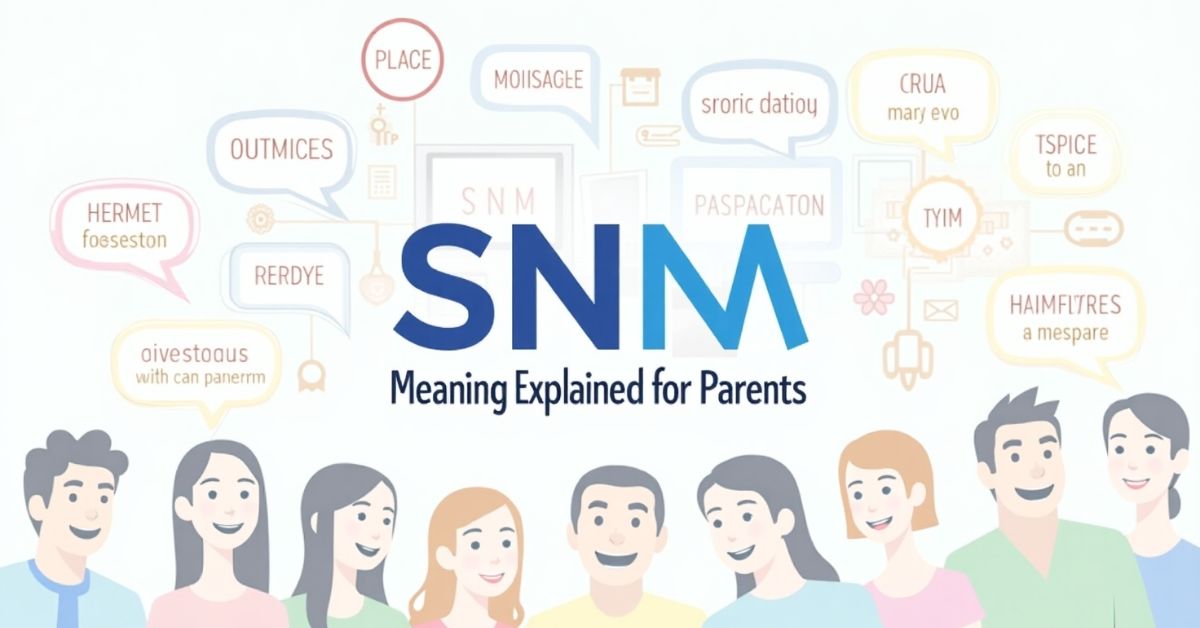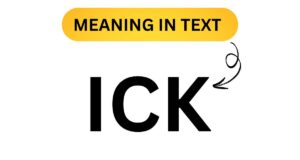SNM Meaning Explained for Parents – Ever heard your teen drop an “SNM” and wondered what on earth it meant? Don’t worry, you’re not alone! Slang changes faster than you can blink, and keeping up with your teen’s lingo can feel like chasing after a moving target. But understanding these phrases is crucial for staying connected and making sure your kid isn’t saying something more than you realize.
In this article, we’ll break down exactly what “SNM” means, how it’s used, and why you should care as a parent. Ready to decode your teen’s secret language?
What Does SNM Mean? And Why Should You Care?
At its core, SNM is short for “Say No More.” It’s a casual, friendly expression used to show that you completely understand what someone is saying, and there’s no need for further explanation. It’s like when you’re talking to a friend about how tired you are after a long day of work, and they respond with “SNM,” meaning “I get it, no need to go into more detail.” It’s a sign of total comprehension and agreement.
Imagine that you’re talking to your best friend about how hard it is to juggle everything in life—work, kids, grocery shopping, and somehow still finding time to watch Netflix. When they say “SNM,” they’re letting you know they understand the struggle. No further words are necessary. It’s a sweet little shortcut to show empathy and solidarity.
And that’s exactly why parents need to pay attention to this term. While “Say No More” is a harmless phrase in most cases, it can sometimes be used in contexts that make it a bit more concerning especially if your teen is using it in conversations related to more questionable topics, like drugs or risky behavior. So let’s make sure you know what’s going on when this term enters the chat.
Breaking Down the “Say No More” Phenomenon
You might be thinking, “Okay, so it’s just an expression why do I need to worry?” Fair question! But here’s the thing: slang evolves faster than you can say “What does that mean?” And while many of these expressions are totally innocent, there are some that are tied to activities or behaviors that you may not want your child to get involved with. That’s why it’s essential to understand not only the literal meaning of these terms but also their context in real life.
Let’s break it down. When a teenager says “SNM,” they’re most often using it to signal the end of a conversation. It’s like waving the white flag of communication, saying, “I understand you, and we don’t need to go any deeper into this.” It’s shorthand for, “We’re good, no more explanation needed.”
But as with any slang, how it’s used matters. Here are a few examples to illustrate this:
Scenario 1: The Stressful Project
- Person A: “I just finished that massive project for tomorrow. It was so stressful!”
- Person B: “SNM, bro, I was up all night with it.”
- Person A: “Yeah man, I need some sleep now.”
Here, “SNM” is just a simple acknowledgment of shared frustration. Person B is telling Person A, “I get it, we’re on the same page. I’ve been there, done that.”
Scenario 2: Party Plans
- Person A: “Hey, are you going to Jake’s party tonight?”
- Person B: “For sure, I’ll be there around 9.”
- Person A: “SNM, I’ll see you then!”
This is just a friendly way of wrapping up the conversationcno need to discuss plans any further because everything’s clear.
The Dangers of Slang (And How to Protect Your Teen)
Now, here’s where things can get a little trickier. While “SNM” might seem innocent enough, like most slang terms, it can sometimes be used in darker contexts. Sometimes, kids will use terms like this as a way of signaling that they’re involved in something risky, or it could be tied to less-than-ideal behaviors. For example, when talking about things like drugs or bullying, “SNM” might be used to signify that a conversation doesn’t need to go any deeper because both people already know what’s going on.
As a parent, this is where it gets important to pay attention. If you notice your teen using “SNM” in contexts where the conversation seems to be about something more serious (like trouble at school, drug-related talk, or other harmful behaviors), it’s a good idea to check in. Having an open and non-judgmental conversation with your teen is crucial to understanding how they’re using this phrase and what it means in the context of their life.
Examples of “SNM” Being Used in Less Innocent Ways
Let’s take a quick look at some scenarios where “SNM” could have a different connotation:
Scenario 3: Risky Business
- Person A: “So, are we really going to do this?”
- Person B: “SNM, I’m in. Let’s go.”
Here, “SNM” is used to signify agreement on a decision, and while it seems innocent, if the context is about something illegal or dangerous (like skipping school, sneaking out, or participating in risky activities), it could be a red flag that your teen is involved in something they shouldn’t be.
Scenario 4: Bullying or Peer Pressure
- Person A: “Did you hear what happened to Sam today?”
- Person B: “SNM, I already know. Let’s not talk about it.”
Again, “SNM” is used to end the conversation, but if the context is about teasing, bullying, or excluding someone, this phrase might be part of a larger problem. In these cases, it’s helpful to step in and make sure your child is being kind and respectful to others.
Why Parents Should Be Vigilant About Slang
Okay, so we’ve established that “SNM” is not necessarily harmful by itself. But as parents, it’s essential to understand the full picture. Teenagers often use slang as a way of communicating in ways that are secretive or that only they (and their friends) fully understand. This can be fine when the slang is harmless, but it can also be a cover for more troubling conversations.
Here are some tips for keeping an eye on things:
- Ask Questions: Don’t be afraid to ask your child what certain phrases mean. “Hey, I heard you say ‘SNM’ the other day what does that mean?” It can be an opportunity for an open conversation.
- Stay Informed: Slang changes faster than you can say “You kids these days.” Try to keep up with the terms your teen is using so you can stay on top of things.
- Use Parental Control Apps: There are some great apps out there that can help you monitor your child’s phone and text messages. These apps can alert you if certain words or phrases, like “SNM,” are popping up in conversations that might be a red flag.
- Build Trust: Instead of making your teen feel like you’re snooping, create an environment where they feel comfortable talking to you about anything even the “weird” stuff.
Wrapping It Up
So, there you have it! The next time your teen hits you with an “SNM,” you’ll know exactly what they mean. Most of the time, it’s just a casual way of saying, “I get you.” But, as with any slang, context is key. If you’re ever unsure about how a term is being used, don’t hesitate to ask.
And remember, staying involved in your teen’s world even the world of slang is one of the best ways to keep them safe and supported as they navigate the often confusing landscape of growing up. Stay cool, stay informed, and remember: when in doubt, just ask!









